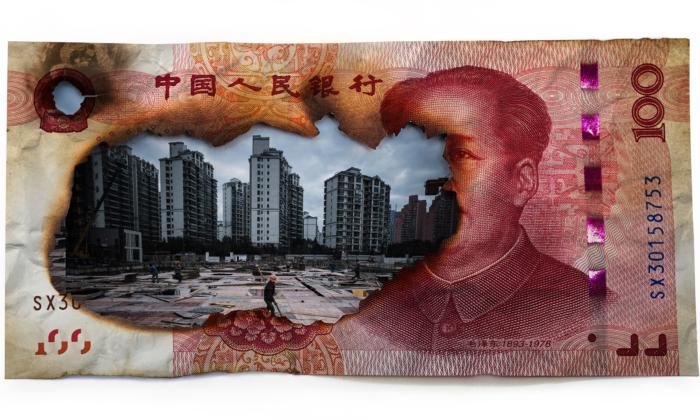The Baha Mar Resort and Casino was supposed to become one of the most glamorous vacation resorts in the Bahamas.
Today, more than four years after groundbreaking, the $3.5 billion project—financed and constructed by China—faces multiple problems and the local developer has filed for bankruptcy in the United States.
The ambitious project, which the Chinese communist regime hoped to showcase in order to win more contracts in the U.S. construction market, has instead become a huge setback for China.
Baha Mar is a project led by Bahamian businessman and developer Sarkis Izmirlian, with financing provided by China’s Export-Import Bank and construction outsourced to China State Construction. Once complete, the beachfront resort was to have around 2,000 hotel rooms, 300 condos, and Las Vegas-style casinos.
Construction began in 2011 and the resort was due to open in December 2014. It was subsequently delayed to March 2015. That deadline was also missed, and construction has now stopped on the Bahamian resort.
The sprawling resort is substantially complete and Baha Mar ramped up hiring earlier this year anticipating a March opening. But the repeated missed deadlines have resulted in a cash crunch, and its developer was forced to file for bankruptcy protection on June 29.
Izmirlian blamed China Construction America, the local arm of China State Construction contracted to build the resort, for the delays causing the resort to lose money.
The Chinese Job
Izmirlian, whose family is one of the wealthiest in the Bahamas, had worked closely with the Bahamas government for more than a decade to bring the Baha Mar idea to fruition. After the financial crisis delayed the project, China stepped in to provide financing, according to a Wall Street Journal report.
Left with few financing opportunities, the Bahamas government handed the contract to China. When complete, the mega-resort would supply jobs to 5,000 locals and account for up to 12 percent of the island’s GDP.
China’s Export-Import Bank bankrolled the project with a $2.5 billion loan to the developer. Izmirlian put in $850 million and the Chinese construction firm contributed $150 million for an equity stake.
China Construction America (CCA) then imported thousands of mainland Chinese construction workers who lived and worked onsite—it was a stipulation for the financing that construction work be carried out by the Chinese company, granting little benefit to local Bahamian contractors. But earlier this year, a pay dispute with the contractor resulted in construction workers walking off the job site, halting development and delaying the project.
The developer subsequently blamed CCA for the delays. “This has caused both sizeable delay costs and forced the resort to postpone its opening. Unable to open, the resort has been left without a sufficient source of revenue to continue our existing business,” Izmirlian said in a statement June 29. Lawsuits were filed against CCA and affiliated companies in Delaware and London seeking damages.
Baha Mar accused CCA of cutting power to the construction site, inflating expenses, and stealing construction documents, according to the bankruptcy filings. Without construction documents, Baha Mar is unable to hire a replacement general contractor to finish the project.
In turn, CCA accused the developer of mismanaging the project, including “replacing the principal architect after construction had commenced, the late and incomplete delivery of design packages, and over 1,300 Construction Change Directives,” according to a statement on July 7.
The resort, which employed around 2,400 workers prior to filing for bankruptcy, had monthly payroll costs in excess of $7.5 million.
In the bankruptcy filing, Baha Mar said the Chinese bank has refused to advance the remaining $112 million as part of its $2.5 billion loan.
Lose-Lose
Bahamas Prime Minister Perry Christie said July 16 that the Bahamian government is seeking to take control of the project and begin bankruptcy proceedings in the Bahamas. Izmirlian’s plan is to reorganize the company under U.S. laws. The island nation’s Supreme Court was set to rule Monday on Izmirlian’s request for bankruptcy under United States jurisdiction. As of press deadline no results were available.
The dueling bankruptcy plans put the future of Baha Mar resort into question, although both Izmirlian and the Bahamas government seem intent on finishing the resort given its importance to the local economy and politics.
CCA, for its part, appears to be invested in the project. In an early July statement, CCA said it has already put in $220 million into the project.
Nonetheless, the Baha Mar project has become a black eye for China. It intended to use the resort as a launch pad to gain more contracts in the Americas. Such revenues would boost GDP at home and channel some of China’s migrant construction workers to secure jobs abroad.
For the Bahamas and its politicians, Baha Mar’s delays supply fresh ammunition to critics who warned against “selling out” to China, which has been increasingly seeking investment opportunities in Latin America and the Caribbean. The countries who accept the loans or investment are then beholden to China and Chinese interests abroad.
“Surely, by now we should know that there’s no such thing as a free lunch,” wrote Adrian Gibson, columnist at the Bahamas Tribune.





Friends Read Free